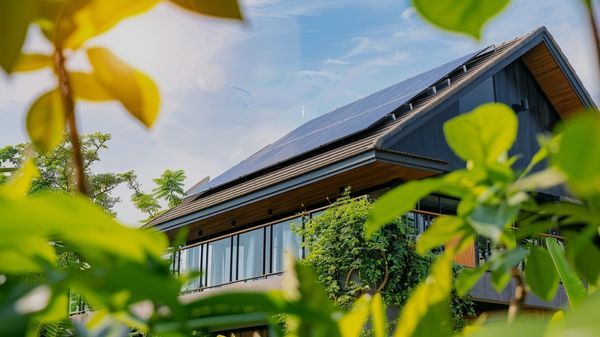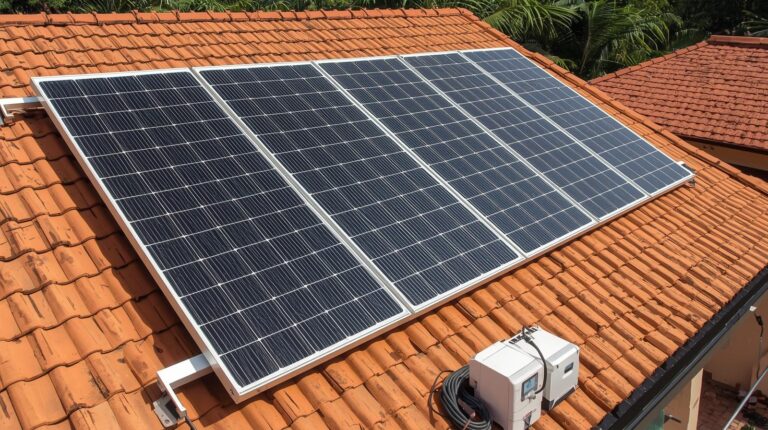Implementing home solar panels can be a wise financial decision for those seeking to secure long-term savings on electricity costs. With the potential for substantial financial benefits over time, the strategic selection of panel size and placement, coupled with the use of high-quality, efficient panels, forms a solid foundation for maximizing returns.
However, the path to best savings doesn’t end there. By exploring additional avenues such as maintenance practices, government incentives, and energy-efficient strategies, homeowners can reveal even greater potential for cost savings and energy efficiency.
Key Takeaways
- Opt for high-quality panels for superior efficiency and long lifespan.
- Regular maintenance ensures peak performance and long-term savings.
- Government incentives like tax breaks and rebates make solar panels financially feasible.
- Energy-efficient practices reduce costs by saving electricity.
- Consider a battery storage system for energy independence and uninterrupted power supply.
Size and Placement
Best sizing and placement of home solar panels are vital factors in maximizing energy production efficiency and long-term savings.
Strategic placement of solar panels is essential to guarantee ideal sunlight capture for increased energy generation. By reducing shading and positioning panels in areas with maximum sunlight exposure, the overall performance of the solar system can be notably enhanced.
Additionally, careful consideration of panel size based on energy needs is crucial for achieving long-term cost savings. Choosing the right panel size that aligns with the household’s energy consumption patterns can lead to improved efficiency and monetary benefits over time.
Efficient placement and sizing of panels play a key role in the success and effectiveness of a solar installation, impacting both the immediate energy production and the future savings potential.
Properly sized and strategically placed solar panels not only maximize energy production but also contribute to enhancing overall energy savings in the long run. Hence, meticulous planning and placement of solar panels are essential for optimizing the benefits of a home solar system.
High-Quality Panels
High-quality solar panels play a critical role in maximizing energy production and cost savings in home solar systems. These panels have superior efficiency, converting a higher percentage of sunlight into electricity, increasing overall energy generation. Additionally, their longer lifespan guarantees sustained performance and a greater return on investment over time.
Panel Efficiency Impact
Premium solar panels display a notable increase in efficiency, yielding higher energy output and enhanced long-term savings potential. When comparing high-quality panels to cheaper alternatives, the efficiency and longevity disparities become evident. The table below highlights the impact of panel efficiency on long-term savings and performance.
| Factor | High-Quality Panels | Cheap Panels |
|---|---|---|
| Efficiency | Elevated | Lower |
| Lifespan | Extended | Shorter |
| Energy Generation | Greater | Less |
| Long-Term Savings | Maximized | Reduced |
Investing in quality solar panels not only ensures a longer panel lifespan but also significantly enhances efficiency levels. This leads to increased energy production and cost savings over the system’s lifetime. By prioritizing quality over initial costs, homeowners can maximize their returns and environmental impact. High-quality panels pave the way for sustainable energy generation and improved financial benefits in the long run.
Quality Panel Lifespan
Solar panels of superior quality are known for their extended operational lifespan, typically ranging from 25 to 30 years. Investing in high-quality solar panels not only guarantees continuous energy savings but also offers greater durability and performance.
These panels are more efficient in converting sunlight into electricity, maximizing energy generation and cost savings over time. In contrast, opting for cheaper panels may lead to lower efficiency and a shorter lifespan, resulting in reduced long-term savings and potential maintenance costs.
Maintenance
Regular maintenance of solar panels is important for ensuring peak performance and longevity, directly impacting the overall efficiency of the system. Service professionals play a key role in maintaining panels, contributing to a cleaner environment and maximizing energy generation. Quality panels and kits that require minimal upkeep offer long-term savings and prevent issues that could affect system output.
Panel Servicing Importance
Ensuring regular maintenance of home solar panels is essential for maximizing energy efficiency and system longevity. Proper panel servicing plays a pivotal role in optimizing the performance of your solar system and ensuring that it operates at its peak capacity.
Here are three key reasons why panel servicing is of utmost importance:
- Efficiency Boost: Regular maintenance helps in keeping your panels clean and free from debris or shading, allowing them to capture the maximum amount of sunlight and convert it into electricity efficiently.
- Early Issue Detection: Scheduled servicing by professionals enables the early detection of any potential issues or malfunctions in your system, preventing costly repairs or replacements down the line.
- Extended Lifespan: By conducting routine maintenance, you can prolong the lifespan of your solar panels, ensuring that they continue to generate clean energy for years to come.
Enhancing System Longevity
Maintenance of home solar panels plays an important role in enhancing the longevity and efficiency of the system. Regular maintenance is vital to guaranteeing the best performance and extending the lifespan of your solar panel system.
By investing in proper servicing by professionals, you can greatly impact the efficiency and effectiveness of your solar panels. Routine upkeep not only helps reduce the chances of system breakdowns but also ensures consistent energy production over the long term.
Reliable maintenance services contribute to a cleaner environment by maximizing energy output and reducing your carbon footprint. By prioritizing maintenance, you not only save money in the long run but also help protect your initial investment in the solar panel system.
Hence, to maximize system longevity and achieve the best performance, it is essential to schedule routine maintenance checks and promptly address any issues that may arise.
Government Incentives
Government incentives play a pivotal role in making home solar panels a financially feasible investment for homeowners. These incentives, such as tax breaks, rebates, and net metering programs, markedly reduce the upfront costs associated with installing solar panels.
Here are three key points highlighting the importance of government incentives:
- Tax Breaks: Government incentives often include tax breaks for homeowners who choose to invest in solar energy. These tax incentives can lower the overall cost of installing solar panels and make renewable energy more accessible to a wider range of homeowners.
- Rebates: In addition to tax breaks, homeowners may also benefit from rebate programs offered by government entities. These rebates provide financial incentives for installing solar panels, further driving down the initial investment required.
- Net Metering Programs: Net metering programs allow homeowners to sell excess electricity generated by their solar panels back to the grid. This not only leads to additional savings on energy bills but also promotes the efficient use of renewable energy resources.
Energy-Efficient Practices
To optimize energy consumption and reduce electricity expenses, implementing energy-efficient practices is essential for homeowners. Simple actions such as turning off lights and appliances when not in use can lead to significant savings on electricity bills.
Investing in energy-efficient appliances is another effective way to lower long-term electricity costs. Additionally, adjusting thermostat settings and maximizing natural lighting can further reduce energy consumption in households.
Small changes in daily habits, like unplugging devices when idle, also contribute to saving energy and cutting down on electricity expenses.
Battery Storage System
Battery storage systems play an important role in enhancing energy independence for homeowners. They enable homeowners to store surplus solar energy efficiently. These systems also act as a reliable backup power source during emergencies, ensuring uninterrupted electricity supply. In addition, by maximizing the utilization of stored solar energy, homeowners can experience significant cost savings on their utility bills.
Energy Independence Benefits
Enhancing energy autonomy through the utilization of battery storage systems allows homeowners to store excess solar power for optimal self-reliance. By harnessing the power of batteries, individuals can reduce their reliance on the grid and guarantee a continuous supply of electricity, especially during peak demand periods or in emergencies.
Here are three key benefits of energy autonomy through battery storage systems:
- Grid Autonomy: With stored solar power, homeowners can depend less on the grid, lessening the impact of power outages and reducing electricity bills.
- Peak Demand Management: Battery storage systems enable users to manage their energy consumption effectively, avoiding high costs during peak demand times.
- Emergency Backup: Batteries serve as a reliable backup power source during blackouts or grid failures, providing peace of mind and maintaining continuous electricity supply.
Backup Power Assurance
Utilizing a battery storage system in conjunction with home solar panels provides homeowners with a dependable backup power solution during emergencies and peak demand periods. By storing excess solar energy in the battery during times of abundant sunlight, homeowners can guarantee a continuous power supply even when the grid is down. This backup power security enhances energy independence by reducing reliance on external sources and mitigating the impact of blackouts or fluctuations in the grid.
Investing in a battery storage system not only offers backup power but also contributes to long-term cost savings and sustainability goals. Homeowners gain greater control over their energy usage, enabling them to optimize solar energy consumption and minimize waste. This additional level of energy management empowers individuals to reduce their carbon footprint while maximizing the benefits of their solar panels.
In essence, a battery storage system plays a pivotal role in securing reliable backup power, promoting energy independence, and enhancing the overall efficiency and savings potential of home solar panel installations.
Cost Savings Enhancement
Implementing a battery storage system alongside home solar panels greatly boosts cost savings and enhances energy efficiency for homeowners. Solar battery technology allows for the storage of excess energy generated by solar panels, providing homeowners with a sustainable and reliable power source.
Here are three key benefits of utilizing a solar battery system:
- Store Excess Energy: With a solar battery system, homeowners can store surplus energy generated during the day for use during peak hours or at night, reducing reliance on the grid and maximizing self-consumption.
- Cost Savings: By storing excess energy and utilizing it when electricity rates are higher, homeowners can significantly decrease their utility bills and overall energy costs, increasing the return on investment of their solar panels.
- Enhanced Energy Independence: Having a solar battery system ensures that homeowners have a reliable backup power source during outages or emergencies, providing peace of mind and further improving energy independence.
Incorporating a solar battery system into a home’s energy setup not only improves cost savings but also contributes to a more sustainable and efficient energy usage model.
Sell Excess Energy
An efficient way to capitalize on surplus energy generated by home solar panels is by selling it back to the grid through participation in net metering programs. Net metering policies allow homeowners to sell excess solar energy back to the utility company, either for credits on their energy bills or direct payments. By leveraging these programs, individuals can not only maximize their savings but also contribute to promoting renewable energy and reducing carbon emissions.
| Benefits of Selling Excess Solar Energy | Description |
|---|---|
| Financial Gain | Earn money by selling surplus energy back to the grid. |
| Environmental Impact | Reduce carbon emissions and promote renewable energy sources. |
| Cost Offset | Offset initial installation costs and decrease energy bills. |
Participating in net metering programs provides an opportunity to earn additional income while making a positive impact on the environment. By selling excess solar energy, homeowners can optimize their savings and contribute to a sustainable energy future.
Track Energy Usage
Monitoring energy usage is crucial for identifying areas to reduce consumption, increase savings, and optimize the efficiency of home solar panel systems. By tracking energy consumption and monitoring solar system performance, homeowners can make informed decisions to enhance the effectiveness of their solar energy setup.
Here are three key benefits of tracking energy usage:
- Identifying Efficiency Opportunities: Monitoring energy consumption allows homeowners to pinpoint areas where energy is being used inefficiently, enabling them to make adjustments that can lead to significant cost savings.
- Real-Time Data with Smart Meters: Utilizing smart meters provides real-time data on energy usage, empowering homeowners to manage their energy consumption efficiently and make timely decisions to optimize their solar system performance.
- Optimizing Solar System Functionality: Regularly tracking energy usage helps in understanding the performance of the solar system, enabling adjustments to be made for improved efficiency and long-term savings.
Tracking energy usage is an essential practice for maximizing the benefits of home solar panels and ensuring sustainable energy consumption.
Solar Panel Cost and Installation
The cost of installing a solar panel system typically ranges from $13,000 to $40,000, depending on factors such as system size and quality. To help you understand the cost breakdown better, here is a table showcasing the average cost ranges for installing solar panels across different states:
| State | Small Installation ($) | High-End Installation ($) |
|---|---|---|
| California | $8,500 | $30,500 |
| Texas | $10,000 | $35,000 |
| New York | $9,500 | $33,000 |
| Florida | $11,000 | $38,000 |
| Arizona | $9,000 | $32,000 |
These figures highlight the variation in costs depending on the location and the type of installation. Remember, after considering rebates and tax credits, the initial investment can be markedly reduced, making it a financially wise decision to install solar panels. By understanding the cost implications, you can maximize your solar energy potential and long-term savings.
Factors Affecting Savings
Factors influencing the potential savings from home solar panels encompass a range of variables, including local grid prices, panel efficiency, installation quality, and energy consumption habits. These factors play an important role in determining the ultimate return on investment for homeowners considering a solar panel system:
- Local Grid Prices: Fluctuations in local electricity rates impact how much homeowners can save by generating their own solar power.
- Panel Efficiency: The efficiency of solar panels directly affects the amount of electricity they can produce, influencing savings potential.
- Installation Quality: Proper installation ensures the best performance of the solar panel system, maximizing savings over its lifetime.
Conclusion
To sum up, maximizing long-term savings with home solar panels involves:
- Strategic placement
- Investing in high-quality panels
- Regular maintenance
- Leveraging government incentives
- Implementing energy-efficient practices
- Selling excess energy
- Tracking energy usage
By considering these factors and optimizing the solar panel system, homeowners can achieve significant financial benefits over time. The cost and installation of solar panels, along with various factors affecting savings, play a pivotal role in determining the overall success and efficiency of a solar energy system.




